Staying healthy and eating a balanced diet are crucial for avoiding long-term health problems and living longer. Obesity and carrying extra weight are big worries these days, sparking the question, “Are Cucumbers Good for Weight Loss?” Doing regular exercise and eating well are super important for keeping healthy. Also, eating the right foods in the right amounts gives your body the stuff it needs to stay strong. Lots of diet plans suggest eating cucumbers because they’re really good for anyone trying to lose weight. Cucumbers don’t have much fat or calories, and they’re full of water and fiber that can help burn fat.
Do Cucumbers Help You Lose Weight?
Cucumbers can indeed be a helpful addition to a weight loss regimen for several reasons. Firstly, they are extremely low in calories and fat, making them a smart choice for anyone looking to shed pounds. With a whopping 96% water content, cucumbers are an excellent way to stay hydrated while keeping calorie consumption in check. Moreover, their soluble fiber content aids in digestion and helps to keep you feeling full for longer periods, which can curb cravings and overeating.
Additionally, cucumbers are packed with essential nutrients, antioxidants, and vitamins that contribute to overall health. These nutrients support bodily functions and help maintain energy levels during weight loss efforts. Specifically, the high water content in cucumbers can help reduce bloating and water retention, leading to a slimmer appearance.
Furthermore, cucumbers have been associated with reducing belly fat and promoting regular bowel movements, which can further support weight loss goals. With only 45 calories in a sizable 11-ounce (300-gram) cucumber, they make for a satisfying and guilt-free snack choice.
Incorporating cucumbers into your diet can be a simple yet effective strategy for managing calorie intake, staying hydrated, and supporting weight loss efforts in a healthy and sustainable manner.

Reasons Why Cucumbers Are Effective for Weight Loss
Cucumbers are packed with nutrients that can support your weight loss journey. Rich in antioxidants, essential vitamins, and other beneficial compounds, cucumbers offer more than just a refreshing crunch—they contribute to a healthy lifestyle and aid in shedding excess weight.
- Hydrating Food
Research suggests that cucumbers are an excellent source of hydration, boasting a remarkable water content of 95-96%. By keeping you hydrated, cucumbers not only support overall health but also contribute to weight loss. Increased hydration can help curb cravings and reduce the likelihood of snacking on unhealthy foods. Moreover, staying hydrated aids in breaking down fats, facilitating the process of burning fat.
- Fewer Calories
When it comes to weight loss, managing calorie intake is crucial. With cucumbers consisting of nearly 95% water, they are low in calories, allowing you to fill up without consuming excessive calories. This can help control your overall calorie intake while keeping you feeling satisfied.
- Nutrient-rich
Cucumbers are a treasure trove of essential vitamins and minerals, including folate, potassium, calcium, and antioxidants. These nutrients offer various health benefits, from reducing inflammation and oxidative stress to regulating blood pressure and blood sugar levels. Incorporating cucumbers into your diet provides your body with the essential nutrients it needs to function optimally while supporting your weight loss efforts.
- Versatility
One of the great things about cucumbers is their versatility. They can be easily incorporated into a wide range of dishes, from salads and sandwiches to smoothies. This makes them a convenient and delicious addition to any weight-loss diet, allowing you to enjoy their benefits in various forms.

7-day Cucumber Diet Plan
Day 1
- Breakfast: Start your day with a slice of whole-grain bread topped with a slice of cheese and fresh cucumber.
- Snack: Enjoy a cup of chopped cucumbers paired with a boiled egg.
- Lunch: Opt for grilled salmon seasoned with lemon juice alongside a refreshing cucumber salad.
- Snack: Grab a juicy orange for a burst of vitamin C.
- Dinner: Savor a light yet satisfying cucumber and snap pea salad.
Day 2
- Breakfast: Kickstart your morning with a refreshing pineapple smoothie.
- Snack: Munch on two cucumbers dipped in hummus for a nutritious pick-me-up.
- Lunch: Indulge in a roast pork and pickled cucumber sandwich for a flavorful midday meal.
- Snack: Enjoy two cucumbers paired with half a cup of tuna for a protein boost.
- Dinner: Dive into a colorful vegetable salad featuring broccoli, green beans, tomatoes, and, of course, cucumbers, drizzled with olive oil.
Day 3
- Breakfast: Blend up a nutritious spinach, cucumber, and apple smoothie to fuel your morning.
- Snack: Nibble on a cup of chopped cucumbers sprinkled with flax seeds for added fiber.
- Lunch: Treat yourself to seared salmon accompanied by an Israeli couscous cucumber salad.
- Snack: Enjoy a big green apple for a refreshing snack.
- Dinner: Delight in coriander-roasted chicken served with a hearty chickpea and avocado salad featuring fresh cucumbers.
Day 4
- Breakfast: Keep it simple yet satisfying with a slice of whole-grain bread topped with cheese and cucumber.
- Snack: Reach for three cucumbers for a hydrating and low-calorie snack.
- Lunch: Enjoy a wholesome meal of brown rice with chicken and cucumbers.
- Snack: Have a banana for a natural energy boost.
- Dinner: Spice things up with spicy hoisin skirt steak served alongside a crisp cucumber salad.
Day 5
- Breakfast: Fuel your morning with homemade granola topped with cherries, blueberries, and Greek yogurt.
- Snack: Snack on two cucumbers for a refreshing and hydrating midday treat.
- Lunch: Dig into a flavorful vegetable salad featuring tomatoes, cucumbers, olives, and feta cheese.
- Snack: Sip on a honeydew, cucumber, and mint beverage for a refreshing pick-me-up.
- Dinner: Enjoy a light yet satisfying cucumber and charred onion salad for dinner.
Day 6
- Breakfast: Blend up another batch of spinach, cucumber, and apple smoothie to start your day on a nutritious note.
- Snack: Munch on two cucumbers for a hydrating and low-calorie snack.
- Lunch: Indulge in a flatbread topped with fava beans, cucumbers, and creamy burrata cheese.
- Snack: Enjoy a flavorful cucumber salad with black mustard and cilantro.
- Dinner: Savor a savory peach and cucumber salad for a light and refreshing evening meal.
Day 7
- Breakfast: Enjoy homemade granola topped with honey, rose berries, and Greek yogurt for a nutritious start to the day.
- Snack: Snack on two cucumbers for a hydrating and low-calorie treat.
- Lunch: Feast on a crisp and crunchy chicken salad featuring cucumbers and carrots.
- Snack: Pair two cucumbers with hummus for a satisfying and nutritious snack.
- Dinner: Conclude the week with a colorful vegetable salad boasting broccoli, green beans, tomatoes, and cucumbers, drizzled with olive oil.

Pros and Cons Cucumbers for Weight Loss
Cucumbers are a popular vegetable known for their refreshing flavor and numerous nutritional benefits. However, like any food, they come with their own set of pros and cons, particularly when considering their impact on overall health and dietary requirements.
Pros of Cucumber
- Bone Health: Cucumbers are rich in vitamin K, which plays a crucial role in improving calcium absorption and supporting overall bone health.
- Cancer Prevention: High levels of cucurbitacins found in cucumbers may aid in preventing cancer by inhibiting the reproduction of cancer cells.
- Cardiovascular Health: With notable amounts of potassium and magnesium, cucumbers contribute to maintaining healthy blood pressure levels and reducing the risk of cardiovascular diseases.
- Antioxidants: Cucumbers are packed with antioxidants that help protect cells from damage and reduce the risk of chronic diseases.
Cons of Cucumber
- Potential for Pesticide Exposure: Conventionally grown cucumbers are often treated with pesticides, which can pose health risks. Opting for organic cucumbers or thoroughly washing them before consumption can help minimize pesticide exposure.
- Digestive Issues: While the fiber content in cucumbers is beneficial for most people, it may cause digestive discomfort for individuals with sensitive stomachs or conditions like Irritable Bowel Syndrome (IBS).
- Allergic Reactions: Although rare, some individuals may experience allergic reactions to cucumbers, manifesting as itching, swelling, or difficulty breathing.
- Limited Protein and Calories: While cucumbers are low in calories, they also provide minimal protein and fat, essential components of a balanced diet. It’s important to incorporate other protein and fat sources into your meals for optimal nutrition.
- Bitter Taste: Certain varieties of cucumbers may have a bitter taste due to the presence of cucurbitacins, especially near the stem. This bitterness can be off-putting for some individuals.
Other Health Benefits of Cucumbers
Cucumbers are not just tasty additions to your meals; they also offer a plethora of health benefits. Here are some of the potential advantages of including cucumbers in your diet:
- Hydration
Cucumbers are composed of over 95% water, making them an excellent choice for hydration. Consuming cucumbers helps replenish fluids in the body, aiding in the prevention of dehydration. Additionally, the electrolytes like potassium and magnesium found in cucumbers contribute to maintaining fluid balance and hydration levels.
- Rich in Nutrients
Packed with vitamin C, vitamin K, potassium, magnesium, and other essential nutrients, cucumbers support immunity and overall health. With low calories and fat content, they are easy to digest, making them a nutritious addition to your diet.
- Promotes Digestion
The high water and fiber content in cucumbers promote digestion by keeping the digestive system hydrated and facilitating the smooth flow of food through the digestive tract. Fiber also helps improve digestion and regulates bowel movements, reducing the risk of constipation and other digestive issues.
- Improves Skin Health
Cucumbers contain compounds that improve skin health, reduce inflammation, and promote wound healing. Anti-inflammatory compounds like cucurbitacin and flavonoids soothe irritated skin, making cucumbers a natural remedy for acne and sunburn. Antioxidants such as vitamin C and beta-carotene protect the skin from free radical damage, preventing premature aging and wrinkles.
- Natural Astringent
Acting as a natural astringent, cucumbers tighten and firm the skin, reducing the appearance of pores and promoting smoother, more youthful-looking skin.
- Anti-Inflammatory Properties
Cucumbers’ antioxidants and anti-inflammatory compounds may help reduce the risk of chronic diseases like cancer, heart disease, and diabetes. Their alkalizing effects also maintain acid-base balance in the body and alleviate heartburn.
- Weight Management
Low in calories and high in water and fiber, cucumbers are an excellent choice for weight management. Including cucumber-infused water in your diet can aid in burning stubborn fat, making it a valuable addition to your weight loss regimen.

Considerations When Losing Weight with Cucumbers
When incorporating cucumbers into your weight loss journey, there are several important factors to consider:
- Low Calorie and Fat Content: Cucumbers are exceptionally low in calories and fat, making them an excellent snack choice for weight loss. With only 14 calories per cup of sliced cucumber, they contribute minimal calories to your daily intake, allowing you to consume them liberally without concerns about weight gain.
- High Water Content: Cucumbers boast a high water content, which can aid in weight loss by promoting hydration and satiety. Consuming cucumber juice or salads before meals can help curb your appetite and reduce overall calorie intake.
- Soluble Fiber Content: Rich in soluble fiber, cucumbers support digestive health by regulating bowel movements and preventing constipation. This can further facilitate weight loss by promoting regularity and alleviating bloating.
- Moderation is Key: While cucumbers are generally safe for most people, overconsumption may lead to digestive discomfort such as bloating and constipation. It’s advisable to limit your cucumber intake to no more than one medium-sized cucumber per day to avoid potential side effects.
- Balanced Approach: Remember that weight loss is influenced by overall calorie balance and lifestyle factors, rather than any single food or diet. Incorporating cucumbers into a well-rounded, nutrient-rich diet, and maintaining a regular exercise routine is essential for achieving and sustaining weight loss goals.

FAQS
What Is the Best Time to Eat Cucumber for Weight Loss?
Cucumbers are a beneficial addition to your diet at any time of the day. For optimal weight loss results, consider incorporating them into your morning routine or enjoying them as part of an afternoon snack. Adding cucumbers to a balanced diet and exercise plan can aid in weight loss while providing essential fiber and hydration.
How Many Cucumbers Can You Eat a Day for Weight Loss?
The number of cucumbers you can eat per day depends on various factors such as your weight, diet, and activity level. While cucumbers alone are unlikely to lead to significant weight loss, including them in moderation as part of a balanced diet is beneficial. Aim for one or two cucumbers a day to reap their health benefits without overdoing it. Remember to prioritize a balanced diet and regular exercise for effective weight management.
Conclusion
While the cucumber diet might result in temporary weight loss when followed for at least a week, it lacks long-term effectiveness and is not good for weight loss sustainability. The cucumber diet, lacking in essential nutrients and overly restrictive, often results in weight regain once normal eating resumes. For those questioning, ‘Are cucumbers good for weight loss?’ the answer is that while cucumbers can be part of a healthy diet, relying solely on such a diet is ineffective for lasting weight loss. Achieving sustainable weight loss requires a balanced, nutrient-dense diet combined with regular physical activity, not just a focus on one type of food.

